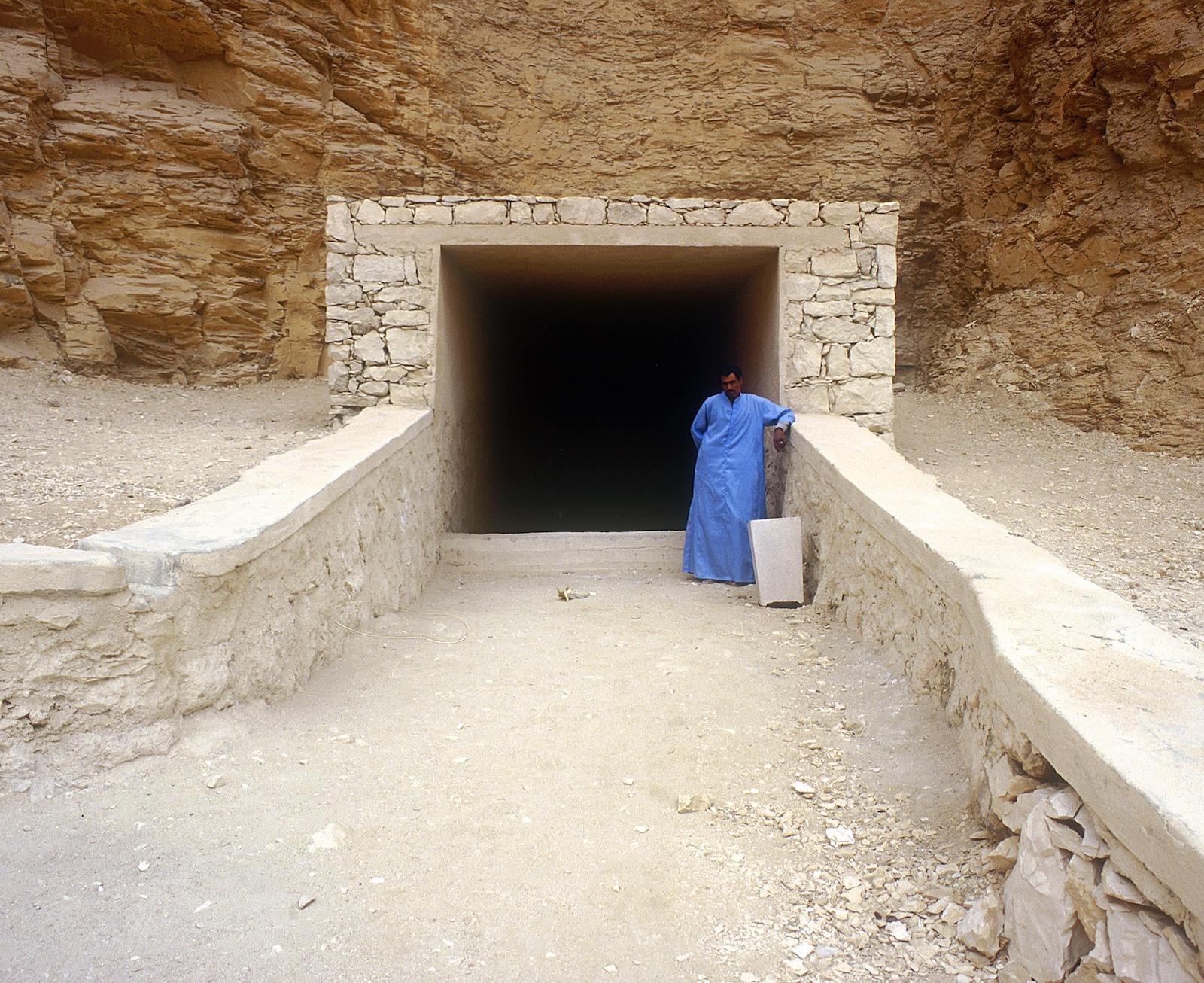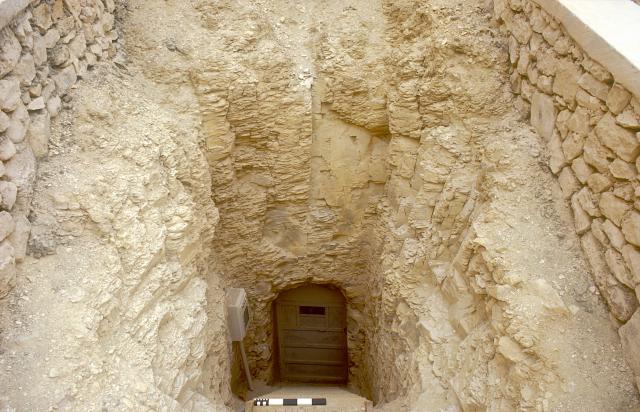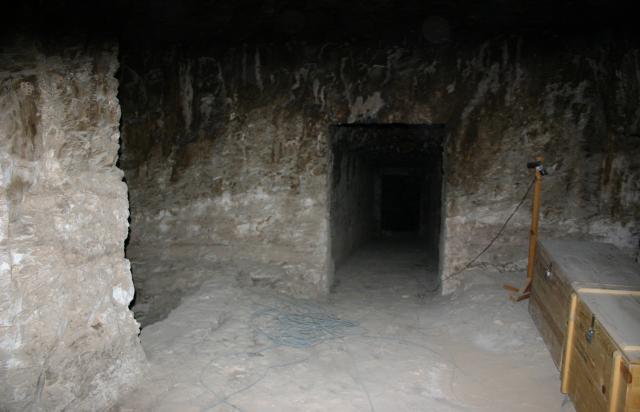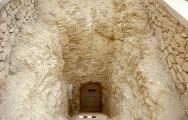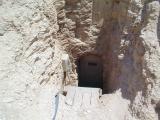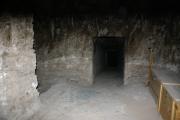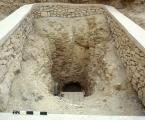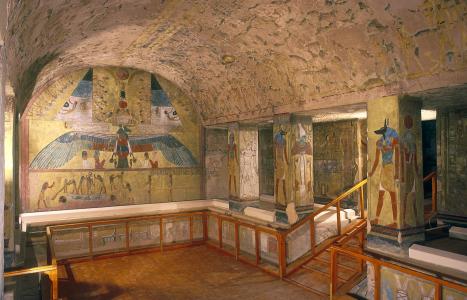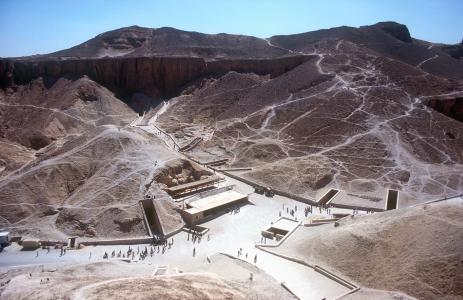KV 12
Unknown
Entryway A
See entire tombThis roughly cut entryway is offset to the northwest of the tomb's main axis. It is similar in design to those of KV 5 and KV 38. The stairway is broken.
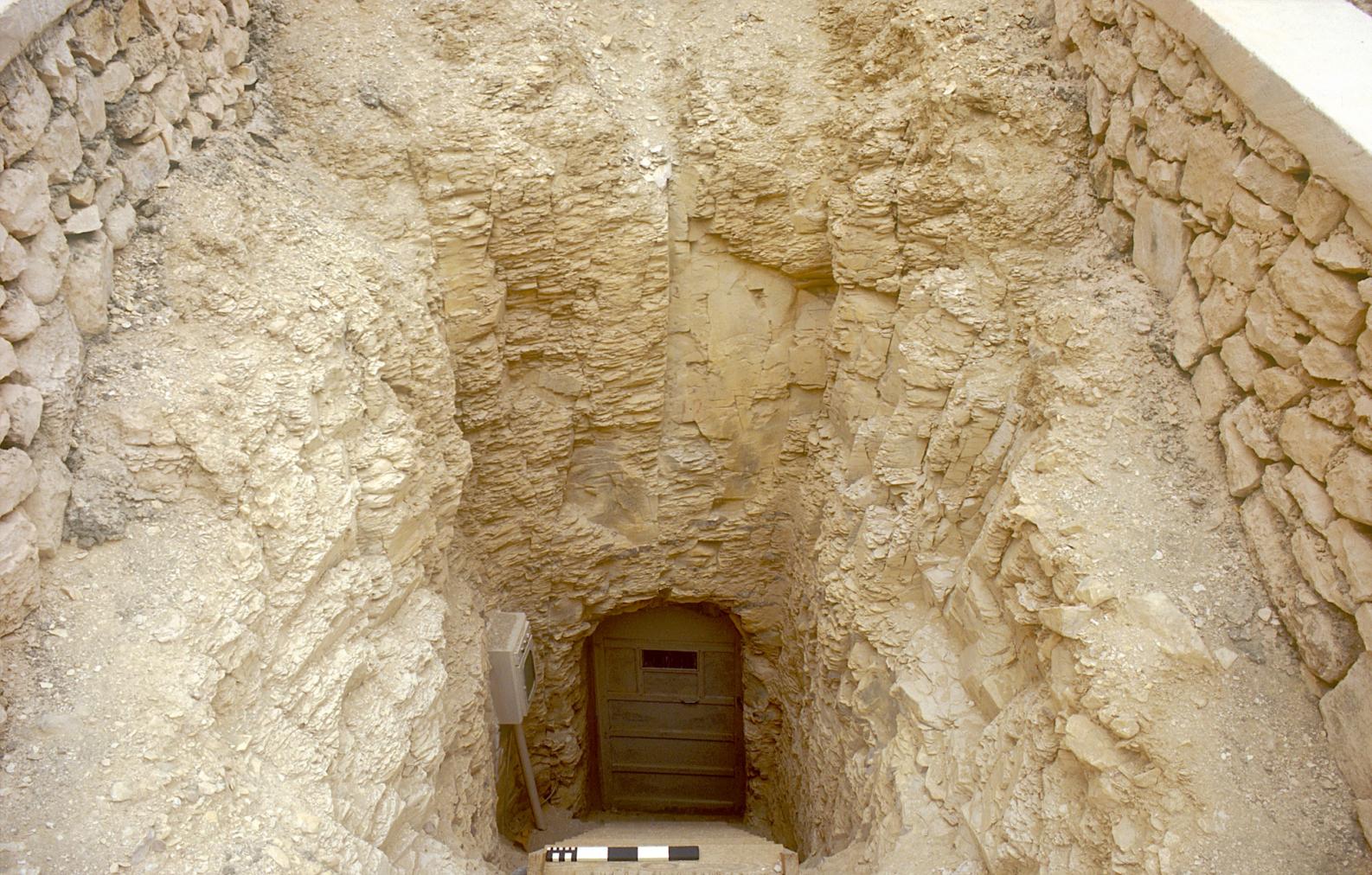
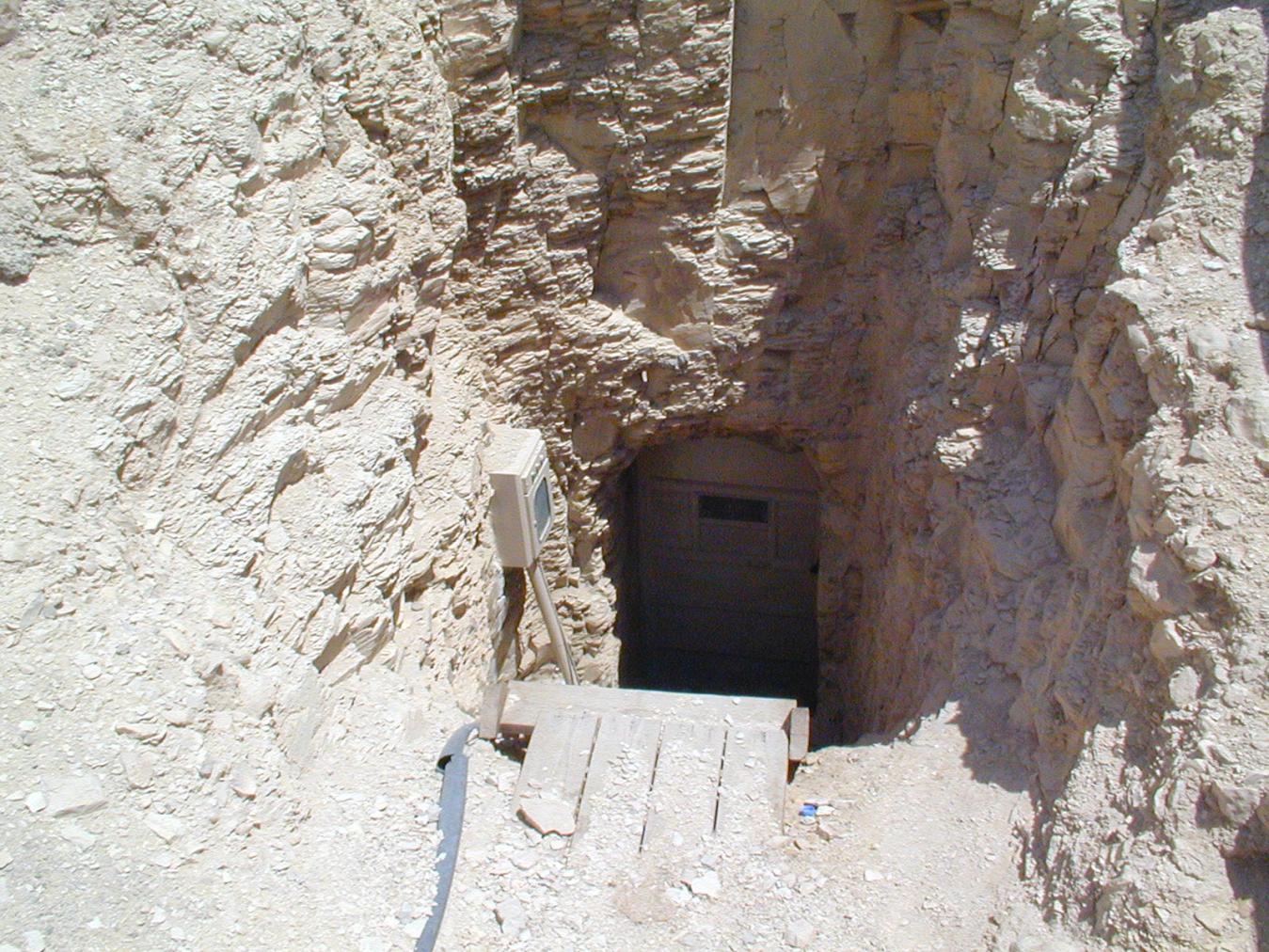
Descent B
See entire tombA set of steps is cut in the floor at the rear of chamber B, left (west) of gate C, between the central pillar and the rear (north) wall. The steps descend towards the northwest corner, and part of the rear wall has been cut back above the right (north) side of the stairway. The edges of the steps near the bottom are not parallel to the upper ones but are skewed to the southwest.
Gate B
See entire tombThe left (west) jamb of this gate is thicker than the right (east) one and roughly parallel to the left side of the entryway. The face of the right thickness is roughly parallel to the right and left walls of chamber B. The rough gate has now been provided with a wooden door. The three lower steps of the entryway that pass through the gate have been repaired in cement.
Chamber B
See entire tombThis roughly finished chamber contains a single central pillar and a stairway which descends westward below the rear (north) wall to an unfinished side chamber (Bb). A gate in the right (east) wall, near the northeast corner, opens to another unfinished side chamber (Bc), and a third unfinished chamber (Ba) opens off the front (south) wall, west of the entrance. A shallow sloping ramp is cut into the floor east of the pillar and leads to gate C in the rear wall.
Gate Ba
See entire tombThe gate is cut in the front (south) wall of chamber B.
Side chamber Ba
See entire tombThis side chamber is unfinished.
Gate Bb
See entire tombThe gate is cut in the left (west) wall of chamber B and is accessible by a stepped descent.
Side chamber Bb
See entire tombThis is an unfinished chamber. Only the lower right (south) part of the front (east) wall was fully cut.
Gate Bc
See entire tombThe gate is cut in the right (east) wall of chamber B.
Side chamber Bc
See entire tombThis unfinished side chamber lies to the right (east) of chamber B.
Gate C
See entire tombThe gently sloping ramp in chamber B passes through this gate to form the floor of corridor C. The opening of this gate widens from south to north (front to back).
Corridor C
See entire tombThe slope of the floor is greater than that of the ceiling. The cutting is smoother and the height is greater at the rear (north) end than the front (south) end of the corridor.
Stairwell D
See entire tombThis long, narrow, and low chamber has three side chambers (Fa, Fb, Fc) off the left (west) wall and one side chamber (Fd) off the right (east) wall. The gates to Fa and Fd are nearly opposite each other, and there are outlines in paint for two additional uncut gates on the east wall opposite gates Fb and Fc. Outlines for a third gate are visible on the rear (north) wall left of gate G.
Gate D
See entire tombThe soffit and threshold of this simple gate are level.
Gate E
See entire tombThe soffit and threshold of this gate slope down from south to north (front to back).
Corridor E
See entire tombThe sloped floor of corridor E connects stairwell D to chamber F.
Gate F
See entire tombThis is a simple gate with a short lintel, a flat soffit and a barely sloping threshold.
Chamber F
See entire tombThis long, narrow, and low chamber has three side chambers (Fa, Fb, Fc) off the left (west) wall and one side chamber (Fd) off the right (east) wall. The gates to Fa and Fd are nearly opposite each other, and there are outlines in paint for two additional uncut gates on the east wall opposite gates Fb and Fc. Outlines for a third gate are visible on the rear (north) wall left (west) of gate G.
Gate Fa
See entire tombThe gate is cut in the left (west) wall of chamber F.
Side chamber Fa
See entire tombThe cutting of the rear (west) wall of side chamber Fa is unfinished, probably due to a vein of hard calcite. The longitudinal axis of this chamber is parallel to chamber F.
Gate Fb
See entire tombThe gate is cut in the left (west) wall of chamber F.
Side chamber Fb
See entire tombSide chamber Fb was unfinished due to a slanting vein of calcite in its rear (west) wall.
Side chamber Fc
See entire tombThe cutting of side chamber Fc was unfinished due to a vein of hard calcite in its rear (west) wall.
Gate Fc
See entire tombThe gate is cut in the left (west) wall of chamber F.
Side chamber Fd
See entire tombThe cutting of side chamber Fd was unfinished due to a vein of hard calcite in its rear (east) wall. The longitudinal axis of the chamber is parallel to that of chamber F.
Gate Fd
See entire tombThe gate is cut in the right (east) wall of chamber F.
Gate G
See entire tombIn 1997, a low wall was constructed across the threshold of gate G to prevent water from reaching the break into KV 9
Chamber G
See entire tombA breakthrough took place at the bottom of the right (east) wall during the construction of KV 9.
Gate Ga
See entire tombThe gate is cut in the left (west) wall of chamber G.
Side chamber Ga
See entire tombThe cutting of the walls is irregular. The chamber is undecorated, but a graffito (no longer visible) was reported on the front (east) wall by James Burton.
About
About
The plan of KV 12, particularly of its lower chambers, suggests that it was intended for multiple burials of royal family members. It lies on a south-north axis and is unusual in several ways. The slightly offset entryway (A) opens into a chamber (B) with a single pillar, three unfinished side chambers (Ba-c), and a stairway, rather than into the long first corridor typical in other tombs in the Valley. This first chamber is followed by two corridors (C and E), separated by a chamber with descent (D).
Corridor E opens to a chamber (F) flanked by four side chambers (Fa-d), and a last chamber (G) with side chamber (Ga). The outermost chambers are roughly hewn, while the innermost chambers are more meticulously cut. Although the inner chambers of the tomb appear to be asymmetrical, the inked outlines of uncut gates show that a balanced set of side chambers was originally intended. It is possible that these side chambers were not cut due to veins of calcite in the rock. The tomb is undecorated, but Burton reported a graffito on the front (east) wall of side chamber Ga.
Noteworthy features:
The builders of KV 9 accidentally broke into this tomb when carrying out their excavations. Where we would expect the first corridor, the tomb builders cut a chamber (B) with central pillar, side chambers, and lateral descent. The unusual design of the tomb with its multiple side chambers is similar to KV 5 (but on a smaller scale), and also to KV 27 and KV 30.
Site History
Because KV 12 is not decorated, and because it has been thoroughly plundered, the exact dates of construction and use are unknown. It was probably begun in Dynasty 18 and used in Dynasty 19 or 20 for multiple burials, perhaps for royal family members, as KV 5 was used by Rameses II. The lower chambers pre-date Rameses VI since the east wall of chamber G was broken through by the tomb cutters of KV 9. If there had been any earlier burials, they may have been plundered at that time.
Dating
This site was used during the following period(s):
Exploration
Conservation
Conservation History
Wooden Steps and a wooden door were built at the entrance in 1994, and the lower steps were repaired with cement. Only a small amount of water entered the tomb during the 1994 flood. Because of the possibility of greater flooding in the future, however, a low wall was erected in gate G in 1997 to protect KV 9.
Site Condition
The walls and ceiling of the first chamber B, the first corridor C and stairwell D are covered with soot. The lower chambers are clean.

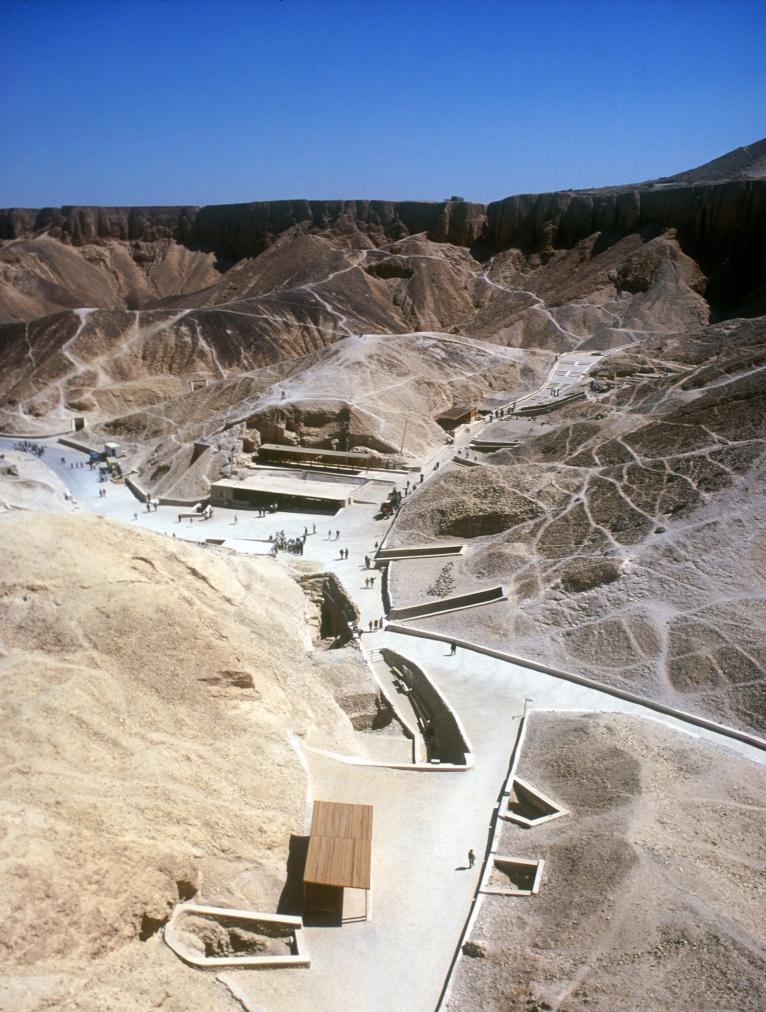
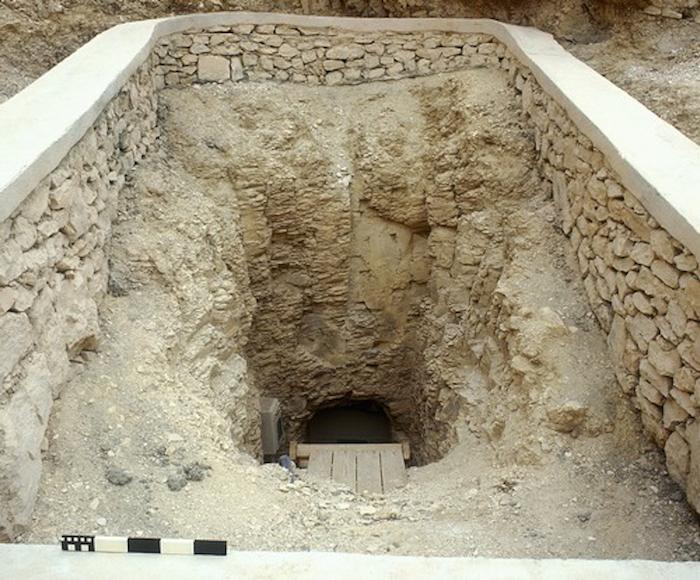
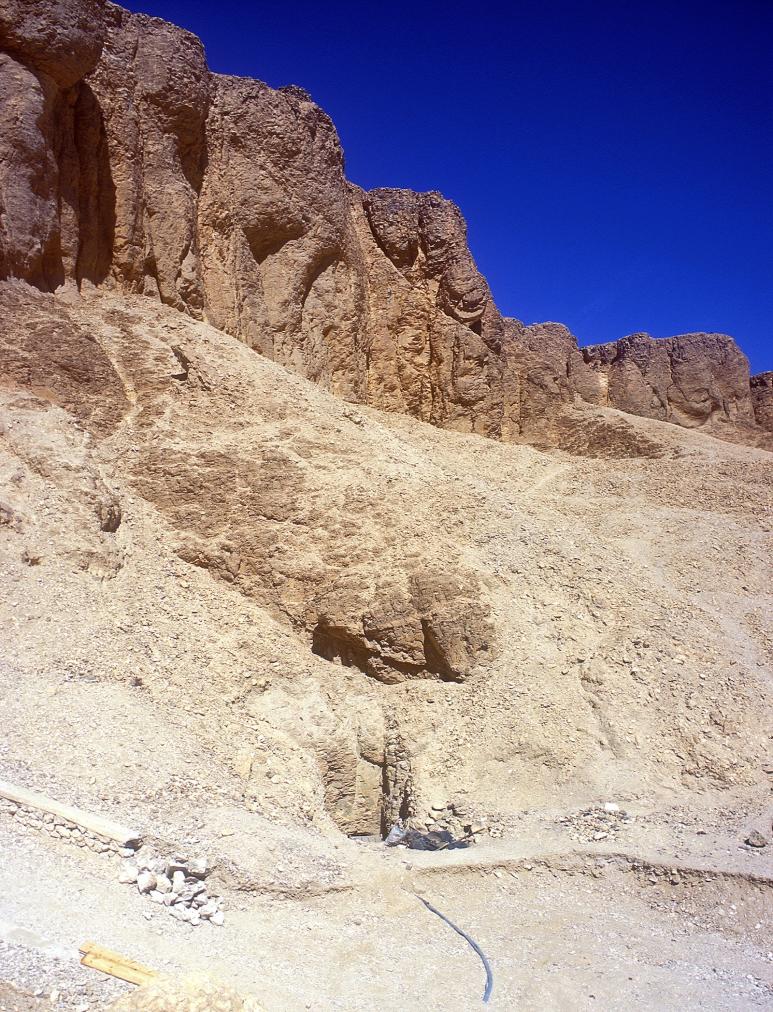

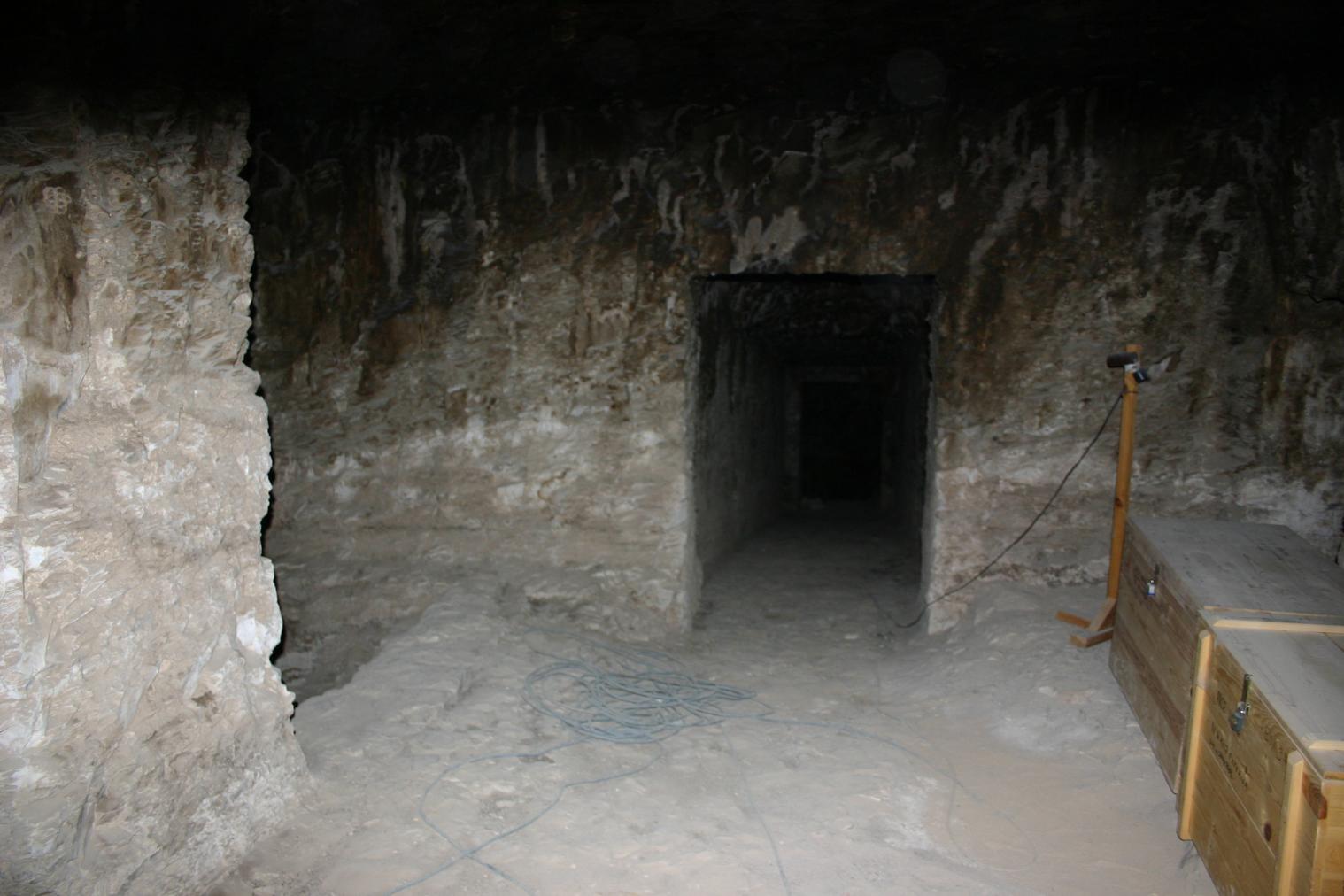
Articles
Anatomy of a Tomb: Ancient and Modern Designations for Chambers and Features
Tombs in Collision
Bibliography
Altenmüller, Hartwig. Untersuchungen zum Grab des Bai (KV 13) im Tal der Könige von Theben. Göttingen Miszellen 107 (1989): 43-54.
Altenmüller, Hartwig. Dritter Vorbericht über die Arbeiten des Archäologischen Instituts der Universitäts Hamburg am Grab des Bay (KV 13) im Tal der Könige von Theben. Studien zur altägyptischen Kultur 21 (1994): 1-18.
Altenmüller, Hartwig. Prinz Mentu-her-chopeschef aus des 20. Dynastie. Mitteilungen des Deutschen Archäologischen Instituts: Abteilung Kairo, 50 (1994): 1-22.
Altenmüller, Hartwig. Zweiter Vorbericht über die Arbeiten des Archäologischen Instituts der Universitäts Hamburg am Grab des Bay (KV 13) im Tal der Könige von Theben. Studien zur altägyptischen Kultur 19 (1992): 15-36.
Fekri, Magdi Mohammed. Une nouvelle enquête sur les tombes civiles et anonyms de la Vallée des Rois. In: Zahi Hawass (ed.), Egyptology at the Dawn of the Twenty-first Century: Proceedings of the Eighth International Congress of Egyptologists, Cairo, 2000. Cairo: AUC Press, 2003. I, 138-146.
Helck, Wolfgang. Königsgräbertal. Wolfgang Helck, Eberhart Otto and Wolfhart Westendorf (eds.). Lexikon der Ägyptologie. 7 vols. Wiesbaden, 1972-1992. 3: 516.
Lefebure, Eugène. Les hypogées royaux de Thèbes, seconde division: Notices des hypogées (=Mémoires publiés par les members de la mission archéologie française au Caire 3, 1). Paris, 1889. P. 122.
Pinch-Brock, Lyla. Collisions, Abandonments, Alterations, Tomb Commencements/Pits, and Other Features in the Valley of the Kings. In: Richard H. Wilkinson and Kent R. Weeks (eds.). The Oxford Handbook of the Valley of the Kings. Oxford: Oxford University Press, 2016. Pp. 117-134.
